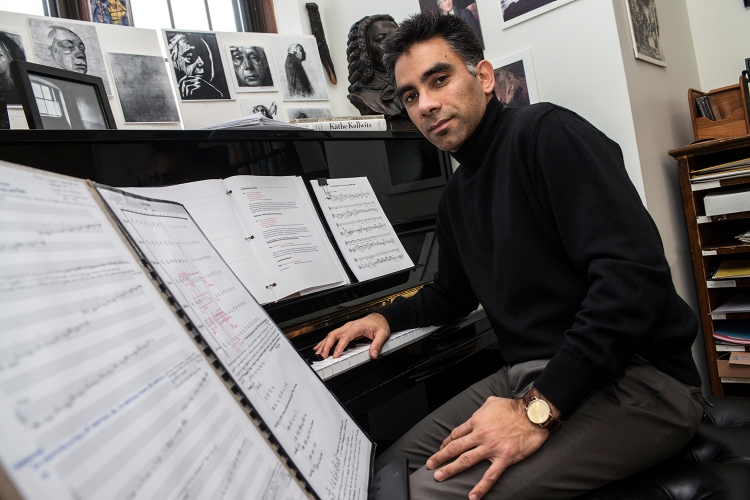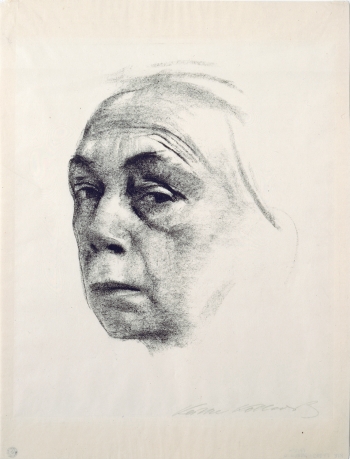
By
On April 8, Gasson 100 will be transformed into a unique performance space, as at 8 p.m. that evening Assistant Professor of Music Ralf Yusuf Gawlick debuts his new song cycle on a legendary German graphic artist.
Against tall black dividers, nine large reprints of self-portraits created over a span of six decades by painter, printmaker and sculptor Käthe Kollwitz will furnish the backdrop for Gawlick’s “Kollwitz-Konnex...im Friedan seiner Hände” (the title translates to “Kollwitz-Connection...in the Peace of His Hands”). Based on Kollwitz’s life, art and writings, the song cycle will be performed by Canadian soprano Anne Harley and internationally renowned guitarist Eliot Fisk.
A prolific and award-winning composer, Gawlick hopes his composition will bring greater attention to Kollwitz (1867-1945), whose work offers an eloquent and searing account of the human condition, and the tragedy of war, in the first half of the 20th century. “Kollwitz-Konnex,” he says, is his tribute to a lifelong inspiration, and now muse.
“She was a remarkable woman and artist, relatively unknown to American audiences,” said Gawlick. “It is my desire, and that of the living Kollwitz heirs, to bring the profound humanism and artistry of her art and writings to Boston College and the wider community.”
In conjunction with the premiere of “Kollwitz-Konnex” — which was commissioned by Fisk and Harley — will be a symposium, a student concert, and art exhibits on display in Burns and Bapst libraries.
Kollwitz lived through two world wars, the great German Depression of the 1920s, the Weimar Republic and National Socialism. She was the first woman elected to the Prussian Academy of Arts, but was forced to resign in 1933. She endured censorship and artistic and professional humiliation, and lost both a son and grandson to war.
The main themes of Kollwitz’s art — life and death, family, children, old age, misery, deprivation, hunger, loss and innocence — confront her day and age, but are ever-present and relevant, according to Gawlick. “Her themes are also ours; every self-portrait is part of a profound humanity with which we can, and must, identify ourselves.”
Gawlick says his deep admiration for the art of Kollwitz – “an art of social conscience” – prompted him to explore her writings, particularly her diary. This exploration led to the conception of a song cycle leading to the collaboration with Harley and Fisk, a connection with Kollwitz’s grandchildren and the Kollwitz Museum directors, he said – and the idea for an interdisciplinary symposium at BC.
“I wanted to give voice to this spiritual kinship with a song cycle that explored the artist through the most intimate self-presentations in image and word: her self-portraits and literary reflections in her letters and diary,” explained Gawlick, lauding the Kollwitz heirs’ generosity to, and assistance with, the project.

Self-portraits figure prominently in Kollwitz’s body of work; she created some 130 in techniques including drawing, etching, lithography, woodcut and sculpture. Gawlick chose nine of these portraits — which represent the six decades of her creative life — as the “fons et origo” [source and origin] of his work, complemented by her writings. “I had no intention to ‘translate’ the selected images into programmatic music. I did seek to establish direct connections between the portraits’ specific graphic mediums and the cycle’s musical language and architecture.”
He was “immediately drawn to the combination of voice and guitar to capture the intimacy of the self-portrait and diary genres. Throughout history, the guitar has been the most faithful companion of the voice. Motivated by its subject, ‘Kollwitz-Konnex’ celebrates the most intimate of musical companions in an unprecedented scope,” Gawlick noted.
The portraits and diary excerpts will be displayed at the April 8 public concert, to “invite the listener-viewer-reader to delve into Kollwitz’ art through the interrelationship of these sisters: music, art and literature,” he added.
Preceding the concert will be the April 7 symposium, “Kollwitz Connection: Artistic, Social and Gender Commentary in the Life and Works of Käthe Kollwitz.” Interdisciplinary presentations and discussions at the event — from 4-7 p.m. in Devlin 101 — will address literary, artistic and linguistic perspectives. Along with Gawlick, participants include faculty members John Michalczyk, Claude Cernuschi and Michael Mulhern (Fine Arts), Michael Connolly (Slavic and Eastern Languages) and Rachel Freudenburg (German Studies). Students also will take part.
A second Kollwitz musical program takes place April 11 at 8 p.m. in Gasson 100. Organized by Adjunct Assistant Professor of Music and Chamber Music Director Sandra Hebert, BC faculty and students will perform music by women composers — some of them contemporaries of Kollwitz — including Clara Schaumann, Lily Boulanger and Cécile Chaminade.
Burns Library will display two of Kollwitz’s works, courtesy of the Boston Public Library Print Department collection, while from April 5-12 the Bapst Library Gallery will feature a student show, “Issues of Self-Portraiture,” organized by the BC Art Club and students in the Art of Portraiture course of Fine Arts Department Visiting Professor Sammy Chong, SJ. The student works were inspired by the study and analysis of Kollwitz portraits and enabled them to depict themselves in this personal artistic genre.
On April 21, “Kollwitz-Konnex” will have its European premiere — attended by the artist’s heirs — at her namesake museum in Köln, Germany.
For more information on the Kollwitz campus events — which are open to the public and free of charge — see the Music Department home page at http://www.bc.edu/music.



